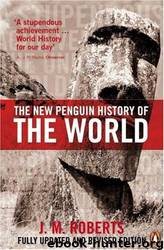The New Penguin History of the World: Fifth Edition by J. M. Roberts & Odd Arne Westad

Author:J. M. Roberts & Odd Arne Westad
Language: eng
Format: mobi, epub
Tags: World, History
ISBN: 9780141007236
Publisher: Penguin Books
Published: 2004-08-01T01:11:48+00:00
4
Europe’s Assault on the World
There was a striking change in world history after 1500 and it was quite without precedent. Never before had one culture spread over the whole globe. Even in prehistory, the cultural tide had seemed set towards differentiation. Now it began to turn. Even by the end of the eighteenth century, the essentials of what was going on were evident. By then, European nations, including Russia, had already laid claim to more than half the world’s land surface. They actually controlled (or said they controlled) about a third of it. Never before had those sharing one particular civilization managed to acquire for their own use so great a territory. The consequences, moreover, had already begun to be shown in irreversible changes. Europeans had already transplanted crops and animal species to begin what was to be the greatest reshaping of ecology ever to take place. To the western hemisphere they sent populations which, already in 1800, constituted new centres of civilization, equipped with European institutions of government, religion and learning. A new nation had emerged from former British possessions in North America, while to the south the Spanish had destroyed two mature civilizations to implant their own. To the east, the story was different, but equally impressive. Once past the Cape of Good Hope (where something like 20,000 Dutch lived), an Englishman travelling on an East Indiaman in 1800 would not land at European colonial communities like those of the Americas unless he wandered as far off course as Australia, just beginning to receive its settlers. But in East Africa, Persia, India, Indonesia he would find Europeans coming to do business and then, in the long or short run, planning to return home to enjoy the profits. They could even be found in Canton or, in very small numbers, in the closed island kingdom of Japan. Only the interior of Africa, still protected by disease and climate, seemed impenetrable.
The remarkable transformation thus begun (and to go much further) was almost entirely a one-way process. Europeans went out to the world, it did not come to them. Few non-Europeans other than Turks entered Europe except as exotic imports or slaves. Yet the Arabs and Chinese were by no means unskilful sailors. They had made oceanic voyages and knew about the compass, while the island peoples of the Pacific made long sea crossings on their mysterious errands. None the less, the ships which came around the Horn or the tip of Africa to Atlantic ports were European and homeward bound, not Asiatic ones.
This was a great transformation of world relationships and it was the work of Europeans. Underpinning it lay layer upon layer of exploration, enterprise, technical advantage and governmental patronage. The trend seemed irreversible by the end of the eighteenth century and, in a sense, so it was to prove, even if direct European rule was to dissolve more quickly than it was built up. No civilization had been more rapidly and dramatically successful, so untroubled in its expansion by any but temporary and occasional setbacks.
Download
The New Penguin History of the World: Fifth Edition by J. M. Roberts & Odd Arne Westad.epub
This site does not store any files on its server. We only index and link to content provided by other sites. Please contact the content providers to delete copyright contents if any and email us, we'll remove relevant links or contents immediately.
| Africa | Americas |
| Arctic & Antarctica | Asia |
| Australia & Oceania | Europe |
| Middle East | Russia |
| United States | World |
| Ancient Civilizations | Military |
| Historical Study & Educational Resources |
Cecilia; Or, Memoirs of an Heiress — Volume 1 by Fanny Burney(32547)
Cecilia; Or, Memoirs of an Heiress — Volume 2 by Fanny Burney(31945)
Cecilia; Or, Memoirs of an Heiress — Volume 3 by Fanny Burney(31931)
The Secret History by Donna Tartt(19053)
Sapiens: A Brief History of Humankind by Yuval Noah Harari(14368)
Leonardo da Vinci by Walter Isaacson(13316)
The Radium Girls by Kate Moore(12018)
Sapiens by Yuval Noah Harari(5366)
How Democracies Die by Steven Levitsky & Daniel Ziblatt(5215)
The Wind in My Hair by Masih Alinejad(5092)
Homo Deus: A Brief History of Tomorrow by Yuval Noah Harari(4908)
Endurance: Shackleton's Incredible Voyage by Alfred Lansing(4769)
Man's Search for Meaning by Viktor Frankl(4583)
The Silk Roads by Peter Frankopan(4526)
Millionaire: The Philanderer, Gambler, and Duelist Who Invented Modern Finance by Janet Gleeson(4465)
The Rape of Nanking by Iris Chang(4203)
Joan of Arc by Mary Gordon(4101)
The Motorcycle Diaries by Ernesto Che Guevara(4089)
Stalin by Stephen Kotkin(3957)
